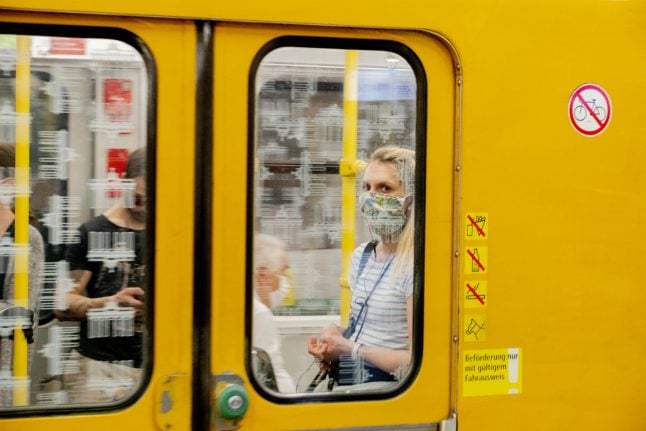The local government voted on Tuesday June 23rd to slap €50 fines on people who don't wear a face mask when it is mandatory to do so, such as when travelling on public transport or in shops.
The fines will range from €50 to €500, reported the Berliner Zeitung on Tuesday. The €500 fine would apply if someone repeatedly violated the obligation to wear masks.
People in Berlin – and in most other places in Germany – have to wear a covering over their face and mouth when travelling on public transport, in supermarkets or retail stores, in tattoo and beauty studios and in hairdressers.
Some states already impose fines but Berlin had held off from doing so.
Die #Maskenpflicht wird nun auch mit #Bußgeldern durchgesetzt. Also: #Maskeauf! pic.twitter.com/qYVvZ7C0Ht
— Senatsverwaltung Gesundheit Pflege Gleichstellung (@SenGPG) June 23, 2020
Contact restrictions set to be scrapped
It came as contract restrictions in the capital were set to be scrapped. At the moment a maximum of five people from separate households or members of two households can meet in public.
In future Berliners will not face this limit. However, the distance rule (1.5 metres between people not from your household) will continue to apply, the Senate decided.
Mayor Michael Müller said people are still called upon to keep their contacts as low as possible in a bid to keep the spread of coronavirus under control.
The Berlin Senate also decided that more people will be allowed into shops at the same time. The previous guideline of a maximum of one person per 20 square metres in a retail area will change to one person per 10 square metres.
Meanwhile, the obligation to collect the details of punters in restaurants, cafes and other venues will remain in place. It means people can be contacted in case of a local outbreak.
Clubs are still not allowed to open.
READ ALSO: Paper, pens and face masks – what life is like as Germany eases out of coronavirus crisis
Events to be allowed gradually
More events will also be possible in Berlin step by step, according to DPA.
From August 1st, up to 500 participants will be allowed to meet in closed rooms. From September 1st, that number will go up to 750 and from October 1st, up to 1,000.
According to the phased plan, outdoor events can include up to 5,000 participants from September 1st. The prerequisite for any relaxation is that organisers have 'coronavirus infections permits' and that distance and hygiene rules are observed.
At present, the upper limits are lower for events such as cultural events, trade fairs, special markets, sporting events, business meetings or commercial leisure activities.
According to earlier Senate rules, up to 150 people are currently allowed in indoor rooms, and from June 30th that limit will climb to 300. For outdoor events, the number of participants is currently limited to 500 and from June 30th it will go up to 1,000.
Limits do not apply to demonstrations or church services as restrictions have already been removed.



 Please whitelist us to continue reading.
Please whitelist us to continue reading.